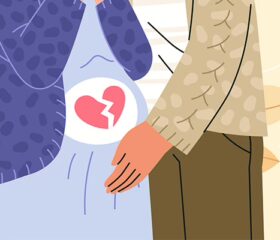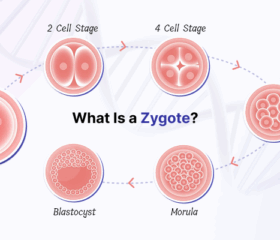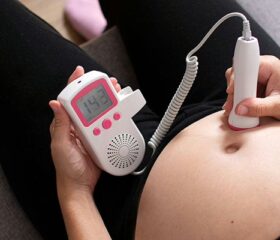What to Know About Miscarriage: Signs, Causes, and How to Cope
Miscarriage is a heartbreaking experience no soon-to-be parent should ever have to go through. Whether it’s your first pregnancy or not, the emotional and physical impact isn’t any easier.

Miscarriages are more common than many people realize, with estimates suggesting 15–20% of known pregnancies end this way. 1 In fact, since miscarriage happens before the 20th week of pregnancy, the actual number may be even higher because many occur before the woman even knows she’s pregnant. 2
Here’s what you should know about the signs and causes of miscarriage, along with a few resources to work through your pain (both emotional and physical).
Miscarriage isn’t the same as stillbirth
Miscarriage is generally defined as pregnancy loss before 20 weeks. Intrauterine fetal demise, better known as stillbirth, occurs when the fetus forms but dies after 20 weeks. 3
What are the signs of miscarriage?
While miscarriage symptoms vary from person to person, there are several common indicators: 4
- Vaginal bleeding: Bleeding or spotting during pregnancy is often the first sign of a miscarriage. It can range from light to heavy bleeding. Not all bleeding in early pregnancy is a sign of miscarriage, but you should let your doctor know if you experience it, as issues like subchorionic hemorrhages (bleeding between the uterine wall and chorion) can sometimes cause miscarriages.
- Cramping and pain: Many women have mild to severe cramping in the lower abdomen or back when they miscarry. This can feel a lot like menstrual cramps, but may be more intense.
- Passing fluid or tissue: You may notice fluid or tissue coming from your vagina. If this occurs, place it in a clean container and take it with you to your doctor’s appointment. This can help your doctor learn more about the cause of the miscarriage, which may help them prevent it from recurring.
- Other signs: Other possible symptoms include other changes in your pregnancy discharge (i.e., you have brown discharge or the consistency changes), or a sudden loss of pregnancy symptoms, like breast pain or morning sickness. (Note that morning sickness typically resolves by the end of the first trimester, so if you’re approaching that milestone and it disappears on schedule, don’t panic!)
In isolation, these symptoms may not be signs of miscarriage, and they all have other potential causes. Sometimes, there are also no obvious signs at all—your doctor might only discover what happened during a routine ultrasound. 5
Regardless, you should always contact your doctor or midwife right away if you think you may be experiencing a miscarriage.
What happens during a miscarriage?
Everyone experiences a miscarriage differently, but here’s what happens in most cases.
You’ll pass the tissue
According to the American College of Obstetricians and Gynecologists (ACOG), you’ll typically pass the embryonic or fetal tissue within 2 weeks. Once the process starts, most of it passes in about 2 to 4 hours after symptoms of cramping and bleeding begin. 6
You may have bleeding and cramping
You may have heavy bleeding and pass blood clots of varying sizes, accompanied by mild to severe cramping. These symptoms may last several hours. Your doctor, nurse, or midwife may ask you about how much blood you pass and the size of the clots, so try to take note of these.
You may or may not see the embryo
Depending on the embryo’s development, you may not see it when it passes. Up to 8 weeks, the embryo will be white or tan and only a 1/4 to 1/2-inch long. At 10 weeks, a fetus is about 1–1.5 inches long. 5
You’ll need to take extra care
It’s important to use a clean sanitary pad or period pants during this time. Avoid using tampons (which you shouldn’t use when pregnant, anyway), menstrual cups, or anything you have to put inside your vagina, as this can increase the risk of infection. 7 8
What causes miscarriage?
There a several different types of miscarriage, which have different causes.
Issues with the embryo’s development cause many miscarriages. About half to two-thirds of first-trimester miscarriages are due to missing or extra chromosomes. 9 These genetic issues can lead to conditions such as:
- Anembryonic pregnancy: Also called a blighted ovum, this occurs when the placenta and gestational sac form, but the embryo does not. 10
- Molar or partial molar pregnancy: The placenta develops normally, but the fetus develops abnormally or not at all. In rare cases, molar pregnancies can become invasive or cancerous. 11
Less common causes include immune system disorders or structural issues with the cervix or uterus.
What to know about vanishing twin syndrome
Vanishing twin syndrome (VTS) is another form of miscarriage specific to twin or multiple pregnancies. It happens when you lose one of your babies during gestation, with the other baby unaffected.
While experts are still unsure about what causes VTS, much like with singleton miscarriages, genetic factors could be to blame.
Losing one baby in a multiple pregnancy is no less heartbreaking than a singleton miscarriage. Fortunately, it’s usually harmless for the surviving twin, especially if VTS happens earlier in your pregnancy.
Myths about what causes miscarriage
Contrary to popular belief, things like stress, exercise, sex, use of birth control pills before getting pregnant, and working (unless you’re exposed to harmful chemicals) do not cause miscarriages. 1 12
Try to avoid pointing the blame at yourself or others. While it’s understandable to want to make sense of this painful experience, most miscarriages are out of anyone’s control.
What are the risk factors for a miscarriage?
While many miscarriages are due to random genetic events, some factors can increase your risks of having one: 2
- Age: The risk of miscarriage increases with age. About 50% of first-trimester miscarriages happen due to a chromosomal problem in the baby—and as you get older, the risk of chromosome problems increases. 13
- Chronic health conditions: You may be more at risk of a miscarriage if you suffer from conditions like uncontrolled diabetes, thyroid disease, or hormonal imbalances. 14
- Uterine or cervical issues: The cervix opening too early, known as cervical insufficiency, can be a factor. Other structural problems with your uterus could also contribute to miscarriage. 15
- Lifestyle factors: Smoking, drinking wine or other alcohol while pregnant, and illegal drug use all increase your risk of miscarriage. It’s possible that high levels of caffeine consumption are correlated with an elevated risk, although moderate consumption (less than 200 mg per day) is considered safe. 16 17 Women who are underweight or overweight may also be at higher risk. 18
- Genetic factors: Sometimes, one partner may carry a genetic condition that increases the risk of miscarriage.
Do recurrent miscarriages influence future losses?
Again, the causes of miscarriages are often difficult to determine. Most early miscarriages are due to random genetic issues. However, recurrent (repeated) miscarriages can be caused by an underlying problem, so you’ll need to get checked over by your doctor.
Even if no cause is found (meaning your doctor isn’t able to “treat” it), you have about a 65% chance of having a successful pregnancy after a miscarriage. 19
What to expect emotionally after a miscarriage
Miscarriage can bring about a wide range of emotions. You may feel shock, grief, or despair. You may also feel disappointed, guilty, or even relieved. Your feelings may change with time.
There’s no right or wrong way to feel after a miscarriage. All your reactions are completely normal, so give yourself the space to feel them.
Take care of yourself physically and emotionally while you grieve. Surround yourself with supportive people who can comfort you, whether that means your partner, friends, or your family.
Seeking support and resources
If you don’t have someone you feel you can lean on or need extra support, take advantage of some of the resources you have available:
- Your doctor: They’re a trustworthy (and private) source of help for understanding what is and isn’t a normal reaction and can point you to resources for emotional support.
- Counselors or support groups: Many counselors and support groups specialize in pregnancy loss. You can also meet other people who have experienced miscarriages through online support groups. Organizations such as the Pregnancy Loss Support Program offer peer support counseling and run support groups for grieving families.
- Hotlines: There are free miscarriage-focused hotlines, such as the Miscarriage and Abortion Hotline, where you can talk about your feelings in a safe and private space.
- Planned Parenthood or similar centers: Along with advice for planning future pregnancies and birth control options, these centers offer support for parents dealing with miscarriage.
When to seek immediate medical attention
While your doctor will keep a close eye on your progress throughout your pregnancy (and following your miscarriage, if you’ve had one), get medical attention immediately if you experience: 20 21
- Sharp, sudden abdominal pain
- Cramping
- Unexpected vaginal bleeding or a missing period
- Brown vaginal discharge
- Pain at the top of your shoulder
- Diarrhea, vomiting, or nausea
- Feeling very dizzy, faint, or sick
These symptoms could indicate an ectopic pregnancy. This occurs when a fertilized egg implants itself outside of the uterus, such as inside a fallopian tube. This can become a life-threatening condition, so it’s important to rule it out immediately.
Septic miscarriage and hemorrhage
If a miscarriage does not pass from your body, the tissue may become infected. This is known as a septic miscarriage, and it’s a serious medical condition, so see your doctor straight away if you have: 15
- A fever
- Chills
- Foul-smelling vaginal discharge
- Heavy bleeding
Heavy bleeding and chills are also potential signs of anemia caused by hemorrhage (uncontrolled bleeding). Other symptoms include faintness or dizziness, fast or irregular heartbeat, and shortness of breath. 22 If you experience any of these symptoms, call 911 immediately.
Final thoughts
Everyone recovers from a miscarriage at their own pace, so give yourself the time you need to heal. You’re not alone—many other parents-to-be have gone through the same experience.
Take advantage of the resources for grieving parents, and never hesitate to speak with your doctor if you have any concerns. As painful as things might be right now, it wasn’t your fault.
Article Sources
- Harvard Health Publishing. "Miscarriage" Retrieved May 14, 2025.
- MedlinePlus. "Miscarriage" Retrieved May 14, 2025.
- The Children's Hospital of Philadelphia. "Stillbirth" Retrieved May 14, 2025.
- Johns Hopkins Medicine. "Miscarriage" Retrieved May 14, 2025.
- Planned Parenthood. "How do I know if I’m having a miscarriage?" Retrieved May 14, 2025.
- American College of Obstetricians and Gynecologists. "What Happens After a Miscarriage? An Ob-Gyn Discusses the Options." Retrieved May 14, 2025.
- University of Iowa. "Miscarriage Care Instructions–Expectant Management" Retrieved May 14, 2025.
- Columbia Health. "How soon after a miscarriage can you have sex?" Retrieved May 14, 2025.
- University of Utah Health. "Recurrent Pregnancy Loss" Retrieved May 14, 2025.
- Cleveland Clinic. "Blighted Ovum" Retrieved May 14, 2025.
- MedlinePlus. "Hydatidiform mole" Retrieved May 14, 2025.
- University of Utah Health. "How to Transition Off Birth Control for a Healthy Start to Pregnancy" Retrieved May 14, 2025.
- Stanford Medicine Children’s Health. "Risks of Pregnancy Over Age 30" Retrieved May 14, 2025.
- UC Davis Health. "What you should know about miscarriage signs, early miscarriage and more" Retrieved May 14, 2025.
- The Children's Hospital of Philadelphia. "Miscarriage" Retrieved May 14, 2025.
- Eunice Kennedy Shriver National Institute of Child Health and Human Development (NICHD). "Couples’ pre-pregnancy caffeine consumption linked to miscarriage risk" Retrieved May 14, 2025.
- American College of Obstetricians and Gynecologists. "Moderate Caffeine Consumption During Pregnancy" Retrieved May 14, 2025.
- UCLA Health. "Miscarriage" Retrieved May 14, 2025.
- American College of Obstetricians and Gynecologists. "Repeated Miscarriages" Retrieved May 14, 2025.
- UCHealth. "Ectopic pregnancy" Retrieved May 14, 2025.
- MedlinePlus. "Ectopic pregnancy" Retrieved May 14, 2025.
- MedlinePlus. "Anemia" Retrieved May 14, 2025.







